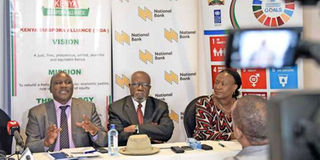Diaspora convention unearths growth possibilities

Left to Right: Dr Shem Ochuodho, Mr Isaac Omollo Okello and NBK’s Alice Kimuhu during a media briefing on the fourth diaspora conference at Crowne Plaza on December 22, 2017. The fifth edition ended last Friday. PHOTO | FILE | NATION MEDIA GROUP
What you need to know:
- The convention is increasingly taking an institutional shape as interests converge and intersect — the essence of what may be termed the diaspora economy.
- A number of Kenyans have elected to migrate abroad for good.
- It is a worthwhile consideration given the large diaspora population and the equally large amount in remittances.
As this year’s Kenya Diaspora Homecoming Convention drew to a close Friday, it became evident that Kenya is witnessing an emerging diaspora economy.
The diaspora is a distinguishable economy at par with agriculture or IT essentially because one could observe established and embryonic value chains being negotiated during the convention’s sessions as well at the exhibitions, and one-on-one discussions.
In its fifth year, the convention is increasingly taking an institutional shape as interests converge and intersect — the essence of what may be termed the diaspora economy.
Broadly speaking, there are three groups of stakeholders that were observed engaging, negotiating and lobbying.
The first category comprised the core of the diaspora economy. These are the Kenyans who elected to live and work abroad, trooping back to the motherland from around the world.
Their greatest yearning is for policies and practices that would ensure they make the most out of their hard-earned money.
MIGRATE ABROAD
A number of Kenyans have elected to migrate abroad for good. However, the bigger number of Kenyans living abroad plan to return home at some point. Most have a nagging concern that they will one day return to find that they are unable to find a home to settle down in or money to live on.
In part, it is this “anxiety”, coupled with ill-advised investment approaches such as entrusting their savings with friends and relatives or conniving corporate entities that animated discussions during the conference.
The second category would comprise representatives of supra-national organisations working on international diaspora-related issues. In these respects, the keynote speech by Dr Mukhisa Kituyi, Secretary General of the United Nations Conference and Development (UNCTAD) was a wakeup call on the African population bulge and its implications on migration.
Citing the example of Philippines and India Ambassador Bishar Hussein, director of the Switzerland-based Universal Postal Union (UPU), lobbied for standalone ministry on diaspora affairs.
REAL ESTATE
It is a worthwhile consideration given the large diaspora population and the equally large amount in remittances.
State and non-state firms who recognise the diaspora as a business and ambassadorial opportunity for Kenya made up the third category.
Here statutory entities such as the Kenya Tourism Board, the Kenya Film Classification Board, the Brand Kenya Board and the Kenya Investment Authority were on hand to “sell” Kenya as tourism, film-making and investment destination.
The private sector representation was monopolised by real estate companies like the Vipingo Development, Centum and the Optiven Group, with packages tailor-made for Kenyans abroad.
Financial service providers included established companies such as the Capital Markets Authority and start-ups like Eclectics International which links Kenyans abroad to SACCOS or Zimele, a pension plan company all eyeing the diaspora remittances pie.
Essentially, these three groups constitute, in a manner of speaking, customers on the one hand of the value chain and service/product providers on the other.
DIASPORA ECONOMY
Against this background, the participants arrived at the conference well aware that the three groups need each other in the context of the diaspora economy.
However, it was also clear that the three broad chips in the diaspora economy equation are yet to optimally interlink. A lot remains to be done if this huge reservoir of intellectual and financial resources is to be fully tapped.
A key missing link that hampers the diaspora economy is the kind of work only Government agencies can sort out – statistics.
Do the number-crunching agencies like the immigration department, the Central Bank of Kenya, the diaspora division at the Ministry of Foreign Affairs and Kenya National Bureau of Statistics have diaspora figures somewhere? If not, can they work on the stats to enable a much more targeted approach by all parties?
LUCRATIVE RESOURCE
Propitiously, Kenya is preparing for a national census in 2019. This provides an opportunity because diaspora-specific stats can be obtained thereby aiding the strategies of the diaspora economy. For, in the absence of figures, interested parties are essentially shooting in the dark.
From both the supply and demand end of things, the Kenyan diaspora economy is a lucrative resource that can add substantially to the country’s economic growth. It needs nurturing.
Dr Wekesa is a media and geopolitics scholar at University of the Witwatersrand, South Africa: [email protected]





